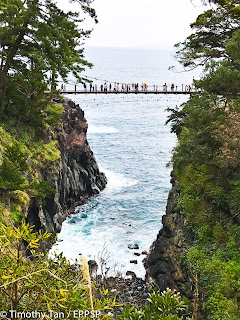Bucket List: 20 Million Years of Geological History
Japan, Shizuoka Prefecture, Izu Peninsula Geopark - UNESCO Global Geopark
After a sumptuous breakfast at a local Ryokan in the hot spring
resort town of Ito, we packed our stuff, checked out of our
accommodation and drove to our next intended destination, the Izu
Peninsula Geopark.
Visitors to the Geopark crossing the Kadowaki Cape Suspension Bridge, Izu Peninsula Geopark, Shizuoka Prefecture, Japan (2017)
Designated
as a UNESCO Global Geopark, the Izu Peninsula Geopark spreads over a
large area on this peninsula located in the south-eastern of the
main island of Honshu.
The Izu Peninsula is the only part of Honshu that geographically sits on the
Philippine Sea Tectonic Plate. The peninsula itself has been
constantly shaped and re-shaped due to the geographical shifting of the
tectonic plate on which it sits on. These constant volcanic activities and
tectonic plate movements account for the abundance of natural hot
springs that are found in the peninsula today.
With
its rich history borne out of the planet's natural geological
activities, the Izu Peninsula is renowned as an important tourist
destination in Japan for international as well as local domestic
travellers. The famous hot spring resorts of Atami and Ito contribute
greatly to the local economy in this part of Japan.
Cliffs shaped over the course of Earth's history, Izu Peninsula Geopark, Shizuoka Prefecture, Japan (2017)
Landscape carved through the brush strokes of geologic activities, Izu Peninsula Geopark, Shizuoka Prefecture, Japan (2017)
In
our trip, we visited only the western parts of the sprawling geopark,
having followed the coastal road from Ito on the western edges of the
peninsula. It was a great drive, with magnificent views alternating
between that of the Pacific Ocean and local villages as our rented
vehicle wind its way down the coastal road.
Trees much older than me but much younger than the Land, Izu Peninsula Geopark, Shizuoka Prefecture, Japan (2017)
One of the many views of the geology of the park, Izu Peninsula Geopark, Shizuoka Prefecture, Japan (2017)
Looking into the Pacific Ocean from the edge of a cliff, Izu Peninsula Geopark, Shizuoka Prefecture, Japan (2017)
This
was my first visit to a UNESCO Global Geopark or any geopark in all my
trips and I was awed by the natural wonders of Mother Nature. Taking in
the views of nature, shaped through more than 20 million years of
geological history was mind-blowing. The activities of monogenetic
volcanoes that had and are still continuously shaping the area for more
than 150,000 years until the present day made me feel so small, not even
a mere speck in the history of time.
Map of the areas of the Geopark which I visited during my trip, Izu Peninsula Geopark, Shizuoka Prefecture, Japan (2017)
I will never, in this life, understand much about the geological
history of Earth. But I certainly can travel to experience its majestic
beauty. To see, to experience and to
feel.
At
the end of my visit, checking an item off my travel bucket list had
become a non-significant personal achievement. Instead, taking in the visual
sights of 20 million years of the planet's geological history was simply
incomparable and had become the main highlight of the trip.
Park signs, Izu Peninsula Geopark, Shizuoka Prefecture, Japan (2017)
The Kadowaki Cape Lighthouse, Izu Peninsula Geopark, Shizuoka Prefecture, Japan (2017)
















Comments
Post a Comment